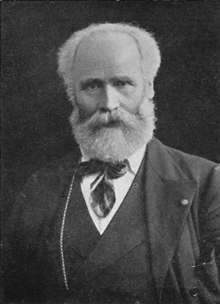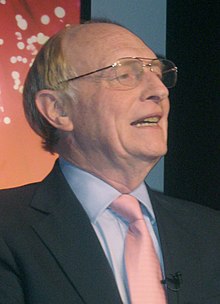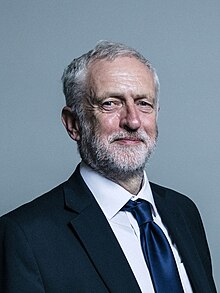使用者:Shangshupuye/英國工黨黨史

19世紀後期英國工黨隨著工會運動而逐漸發展壯大,20世紀20年代初工黨取代了自由黨成為當時執政黨保守黨最主要的反對黨。1930年代和1940年代,工黨強調以工業國有化作為工具實行國家指令計劃,但永遠不贊成由工人控制工業。20世紀20年代經過政黨輪替,工黨獲得執政權,首先是1924年由拉姆齊·麥克唐納領導的少數派政府,1929-31年他又領導一個國民政府。麥克唐納和他的一半內閣分配的主流方和被指責為叛徒。在1940年至1945年,工黨參加了由保守黨占多數的戰時聯合政府。後著名的 1945年的滑坡 在 克萊門特·艾德禮(1945-51)設立了福利國家與 國家保健服務,將英國經濟的五分之一國有化,加入了北約組織並在冷戰中對抗蘇聯。哈羅德·威爾遜的第一個任期(1964-70年)促進了經濟現代化。1974-79年,工黨又一次執政,威爾遜任職兩年後交棒給詹姆斯·卡拉漢。不斷升級的經濟危機(「不滿的冬天」)和黨內一部分人另立門戶、由戴維·歐文領導的社會民主黨,導致工黨在柴契爾夫人統治的1979年至1990年下野成為反對黨。[來源請求]
黨的成立[編輯]
背景[編輯]
勞工代表委員會[編輯]


黨勢上升的早期[編輯]
第一次世界大戰[編輯]
拉姆齊·麥克唐納領導的第一次工黨政府[編輯]

第一次工黨政府(1924年)[編輯]
總罷工(1926年)[編輯]
第二次工黨政府(1929-1931年)[編輯]
大蕭條和麥克唐納領導下的分裂[編輯]
作為國民政府的反對黨時期[編輯]
經濟學[編輯]
外交政策[編輯]
兩次世界大戰間工黨地方組織改革[編輯]
戰時聯合政府(1940年-1945年)[編輯]

艾德禮領導下的戰後勝利[編輯]

威爾遜時代[編輯]
經濟政策[編輯]
社會和教育改革[編輯]
《地方的衝突》白皮書[編輯]
1970年代[編輯]
1974年權力改革[編輯]
歐洲全民投票[編輯]
威爾遜下來的步驟[編輯]

經濟和政治麻煩[編輯]
令人沮喪的經濟[編輯]
教育收益[編輯]
外部的財政幫助[編輯]
在下議院失去多數[編輯]
蘇格蘭民族黨撤回支持[編輯]
"不滿的冬天"和被瑪格麗特·柴契爾擊敗[編輯]
"荒野歲月"(1979-1997年)[編輯]
麥可·富特(1980-1983年)[編輯]

尼爾·基諾克(1983-1992年)[編輯]

約翰·史密斯(1992-1994年)[編輯]
新工黨[編輯]
起源[編輯]

執政[編輯]

下野成為反對黨(2010年至今)[編輯]
愛德·米利班德(2010-2015年)[編輯]

傑里米·科爾賓(2015–至今)[編輯]

相關條目[編輯]
參考文獻[編輯]
深度閱讀[編輯]
- Adelman, Paul. The rise of the Labour Party 1880–1945 (3rd ed. 1996).
- Bassett, R. Nineteen Thirty-One Political Crisis (1958) online
- Bogdanor, V. From New Jerusalem to New Labour: British Prime Ministers from Attlee to Blair (2014).
- Brand, Carl F. The British Labour Party – A Short History (Oxford UP, 1964), online
- Bulmer-Thomas, Ivor. The Growth of the British Party System Volume I 1640–1923 (1967); The Growth of the British Party System Volume II 1924–1964 (1967); detailed scholarly narrative.
- Burridge, Trevor D. Clement Attlee, a political biography (Jonathan Cape, 1985).
- Childs, David. Britain since 1945: A Political History (7th ed. 2012), a standard textbook.
- Clarke, C. & James, T.S. (2015). British Labour Leaders. London: Biteback.
- Davies, A.J. To Build A New Jerusalem: The British Labour Party from Keir Hardie to Tony Blair (1996) Abacus, ISBN 0-349-10809-9
- Diamond, Patrick and Michael Kenny. Reassessing New Labour: Market, State and Society under Blair and Brown (2011).
- Harmer, Harry J. P., ed. The Longman Companion to the Labour Party, 1900–1998 (1999); lists and statistics
- Haseler, Stephen. The Gaitskellites: Revisionism in the British Labour Party 1951–64. (Springer, 1969).
- Jeffreys, Kevin. Leading Labour: From Keir Hardie to Tony Blair (1999).
- Jones, Tudor. Remaking the Labour Party: From Gaitskell to Blair (2005).
- Kavanagh, Dennis. The Reordering of British Politics: Politics after Thatcher. (1997).
- Morgan, Kenneth O. Labour in Power 1945–51 (1984), an influential study.
- Morgan, Kenneth O. Labour People (1987), short scholarly biographies of 30 key leaders
- Pearce, Robert. Attlee's Labour Governments 1945–51 (Routledge, 2006).
- Pearce, Malcolm, and Geoffrey Stewart. British political history, 1867–1990: democracy and decline (1992).
- Pimlott, Ben. Labour and the Left in the 1930s (2008) excerpt and text search
- Pimlott, Ben. Harold Wilson (1992).
- Plant, Raymond, et al. The struggle for Labour's soul: Understanding Labour's political thought since 1945 (2004).
- Pugh, Martin. Speak for Britain!: A New History of the Labour Party (2011) excerpt and text search
- Rogers, Chris. "『Hang on a Minute, I've Got a Great Idea』: From the Third Way to Mutual Advantage in the Political Economy of the British Labour Party." British Journal of Politics & International Relations 15.1 (2013): 53–69. 21st century economics
- Rosen, Greg, ed. Dictionary of Labour Biography. Politicos Publishing, 2001, 665pp; short biographies
- Rubinstein, David. The Labour Party and British Society 1880–2005 (2005)
- Saville, John. The Politics of Continuity: British Foreign Policy and the Labour Government, 1945–46 (Verso, 1993).
- Seldon, Anthony. Blair's Britain, 1997–2007 (2008) excerpt and text search
- Shaw, Eric. The Labour Party Since 1945 (1996)
- Sked, Alan and Chris Cook. Post-War Britain: A Political History (1993), a standard textbook.
- Tanner, Duncan, et al. The Labour Party in Wales, 1900–2000 (2002)
- Tanner, Duncan, et al. Labour's First Century (2007) excerpt and text search, articles by scholars
- Tanner, Duncan. Political Change and the Labour Party 1900–1918 (2003) excerpt and text search
- Thorpe, Andrew. A History Of The British Labour Party (2001) Palgrave, ISBN 0-333-92908-X
- Toye, Richard. The Labour Party and the Planned Economy, 1931–1951 (2003) online
- Swift, David. For Class and Country: the Patriotic Left and the First World War (2017)
- Vickers, Rhiannon. The Labour Party and the World, Volume 1: The Evolution of Labour's Foreign Policy, 1900–51 (2004); The Labour Party and the World Volume 2: Labour's Foreign Policy Since 1951 (2011)
- Whiting, R. C. The Labour Party and Taxation: Party Identity and Political Purpose in Twentieth-Century Britain (2006) excerpt and text search
史學專著[編輯]
- Callaghan,John,et al. eds., 解釋勞動力的締約方:方法勞工的政治和歷史記錄 (2003年) 在網上;也可 在線免費的
- Favrettoa, Ilaria. 'Wilsonism' reconsidered: Labour party revisionism 1952–64. Contemporary British History. 2000, 14 (4): 54–80. doi:10.1080/13619460008581603.
- Taylor, Antony. The Transnational Turn in British Labour History. Labour History Review. 2016, 81 (1): 77–87. doi:10.3828/lhr.2016.4.
